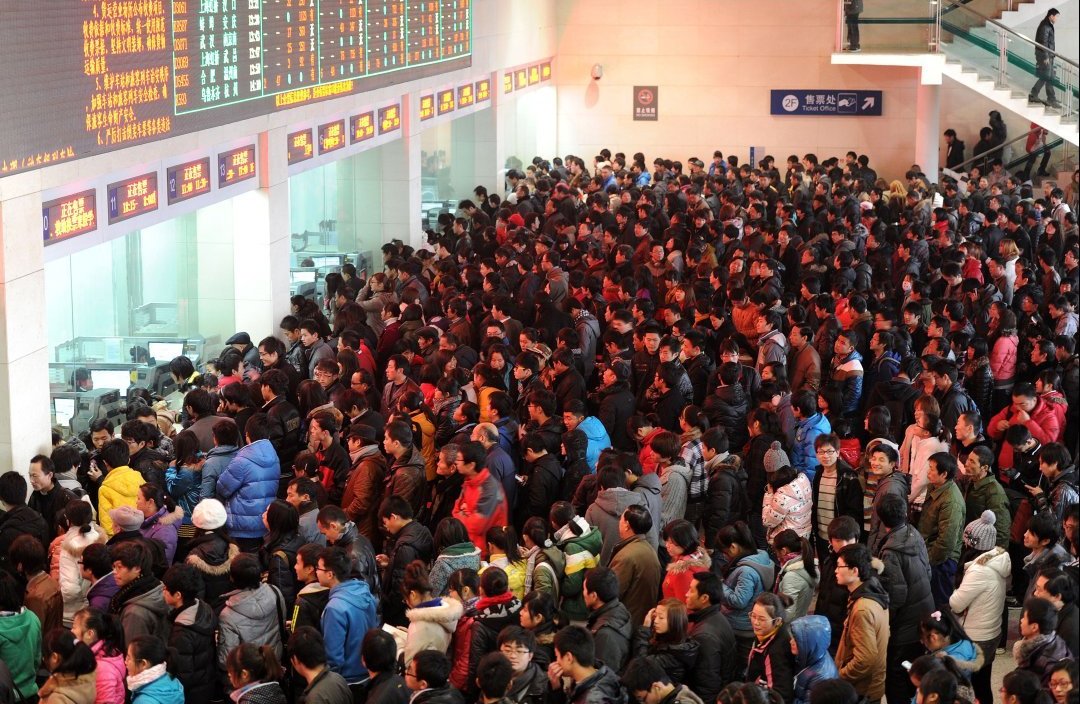The countdown to Chinese New Year is on: in just over two months the annual mega-vacation that western media are fond of calling the largest annual human migration on Planet Earth begins. And with new regulations in place allowing for 60-day advanced purchases of train tickets and reduced penalties for returns, choice routes are selling out now.
So if you're thinking of domestic train travel at Chinese New Year, stop packing your Speedos and bikinis for your tropical Christmas getaway and start thinking Chinese New Year bookings now.
Chinese New Year falls on February 19 in 2015 – and with less than two months to go, Chinese and non-Chinese alike are now able to partake in the mad ticket scramble for travel between February 4 and March 16, online or by phone. Just like every other year, it’s going to be a hot mess, but this year with new wrinkles.
This time around, tickets can be purchased 60 days in advance of the train’s departure date by phone or online, and 58 days in advance at railway stations and ticket outlets.
With this change also comes an liberalized returns policy (in Chinese). Previously, the refund fee ranged between five percent to twenty percent. Now, as long as customers return the ticket more than 15 days (the 15th day not included) ahead of the departure date, the penalty is waived. However, if the ticket is returned with less that 15 days notice passengers will incur these charges:
Date of Ticket Return / Cancellation Fee
More than 15 (the 15th day not included) Days Before Departure / 0
48 Hours to 15 Days Before Departure / 5 percent
24 Hours to 48 hours Before Departure / 10 percent
Within 24 Hours Before Departure / 20 percent
The reduced cancellations creates an opportunity for customers to purchase tickets first and have the option of refunding at no or low penalties later on. In real terms, this has resulted in almost instantaneous sellouts of many routes the minute the tickets have gone on sale. But that also means a new flurry of tickets on previously sold-out routes could become available 15 days prior to departure as people who've booked extra tickets return them to beat the penalty.
The implementation of a real-name ticket policy and identity check has also been introduced to prevent ticket scalping and heighten security, which means foreigners must always present their passport when purchasing/collecting tickets. Tickets can be purchased online, at railway stations (usually English-speaker friendly) or railway ticket outlets around the city (not so English friendly).
English-language websites such as Ctrip English and China Travel Guide provide easy options for foreigners to secure their tickets, eliminating the language barrier or the pain of waiting in a long queue.
Current ticket availability from official outlets is low, with many popular routes already sold out. A search of tickets from Beijing to Chengdu shows that all tickets departing February 1 are already sold out except for standing tickets (you definitely don't want to stand for more than 24 hours), despite February 18 onwards being the usual time people start travelling. For routes that offer both high-speed (gaotie) tickets and normal speed ones, from Beijing to Wuhan for example, all the normal speed tickets have been sold out departing February 1, but the much more expensive high-speed (gaotie) tickets are still available. Some other routes, Beijing to Shanghai for example, still have a good ticket availability due to the route's high capacity.
With the country’s 1.3 billion population showing no sign of decreasing, the number of travelers is also at an all-time high – Xinhua reported a 12 percent increase in passengers last year, with about 266 million railway trips made. Despite the progressive growth and expansion of the mainland’s transportation network, the railway’s online ticketing system has been “notoriously unable to keep pace with the high demand” of passengers travelling during the holiday period, according to the International Business Times.
In the lead-up to the 2014 Spring Festival, trips by road, air, and water reached 3.26 billion, 44.07 million and 42 million respectively, totaling approximately 3.6 billion journeys overall. February 6, the final day of the holiday period, saw the highest number of passengers, with a “record 8.36 million railway trips” as reported by the Ministry of Transport.
Several measures have been taken to reduce the congestion: temporary trains (beginning with the letter ‘L’) have been added, booking office hours have been extended and outlets have also expanded. More policemen are stationed at appropriate areas to ensure public safety.
In preparation for the coming Spring Festival’s stampede, the China Railway Corporation has added 335 additional trains to the already massive network, and recently also announced the addition of sleeper cars on the Beijing-Guangzhou and Beijing-Shenzhen bullet trains for the CNY period (Jan 1 to Mar 15)
With the improved policies on ticket sales and refunds, let’s hope that the authorities, transport network, and the country’s inhabitants can handle all that comes along with this mass commute of people trying to get home to their families this festive season.
Image: Huffington Post
Visit the original source and full text: the Beijinger Blog


